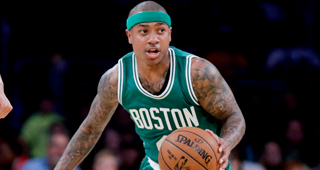Kyrie Irving took control of his future and requested a trade from the Cleveland Cavaliers and it took them a little over a month to settle on an agreement with their biggest Eastern Conference rival to execute a deal that was significantly better than anything else out there.
The Cavaliers were able to get a reasonable facsimile of Irving in Isaiah Thomas, along with Jae Crowder, Ante Zizic and the Brooklyn Nets’ 2018 first round pick. The Cavaliers have more depth and optionality to override the drop-off from Irving to Thomas while also having one of the league’s most valuable long-term assets to use for themselves or convert into another helpful piece in the short-term.
Thomas is coming off an injured hip that hasn’t been surgically repaired and he’s already one of the NBA’s worst defensive players and that will become an even bigger issue as he ages. Irving has hardly given a consistent effort defensively, but he’s capable of at least turning it on at times in the playoffs.
But Thomas is one of the best individual scorers and is coming off a career season in which he had a True Shooting Percentage of .625. Thomas will share the scoring load with LeBron James just as Irving did over the past three seasons. A package with the Suns centered on Eric Bledsoe would have made more sense for the Cavaliers with his capacity to defend, but the sweeteners were nowhere close to what the Celtics traded.
While Crowder’s defense has fallen off recently, he’s still one of the NBA’s best 3-and-D wings on a bargain contract at $6.8 million this season, $7.3 million next season and $7.8 million in 19-20. The Cavaliers had nobody other than James to defend Kevin Durant in last year’s Finals and now Crowder will get those duties whenever he’s in the game. James can slide over to Draymond Green.
The acquisition of the pick from Brooklyn in 2018 gives the Cavaliers a movable asset either at the trade deadline, or in July if LeBron James re-signs. If James leaves, a pick that will likely be in the lottery will help accelerate their unavoidable rebuild just as trading with the Clippers for the pick that became Irving helped them in 2011 after James left the first time.
Cleveland also saved a substantial amount of money in luxury tax payments with this trade.
When comparing what the Cavaliers traded for versus the Indiana Pacers with Paul George and the Chicago Bulls with Jimmy Butler, the trade is even more of a win.
Grade for Cavaliers: A-
Irving is the closest thing the Celtics have had to a true superstar in this era, but perhaps more importantly have avoided re-signing Thomas to a five-year contract at or near the max. The issue with trading down Markelle Fultz for Jayson Tatum wasn’t necessarily about their talent gap as much as it was committing to Thomas.
Boston has been reluctant to give up on Crowder and any future picks for other trade scenarios, so Danny Ainge’s calculus in finally doing so on Irving is an interesting use of resources. While the Celtics have to make this trade to get the best player in the deal who is also several years younger, the cost was massive.
The Celtics have almost entirely turned over their roster since the end of last season, retaining only Al Horford, Jaylen Brown, Marcus Smart and Terry Rozier. Crowder and Avery Bradley were a huge reason why the Celtics have had one of the NBA's best defensive teams and a fall-off is almost certain based on their new personnel and reliance on young players like Jaylen Brown and Jayson Tatum.
This trade makes the Celtics better over the long-term even if it risks that Brooklyn pick. The Celtics also own the Lakers' pick in 2018 and they were running out of ways they can cash those future assets in for an established superstar.
Grade for Celtics: B+



